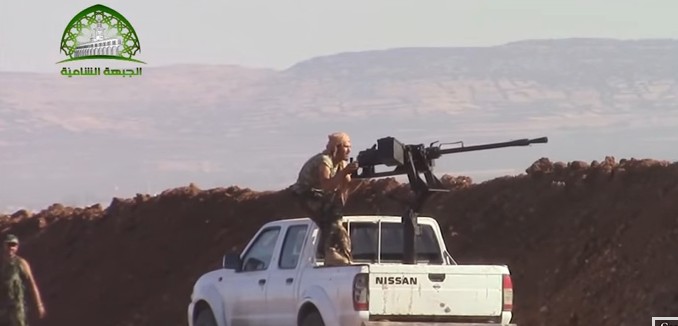The use of Shi’ite militias from across the Middle East to boost the regime of Syrian dictator Bashar al-Assad is the latest example of how Iran uses “Shiite proxies to bolster its reach and influence” across the region, The Wall Street Journal reported (Google link) Wednesday.
Fighters from Hezbollah, Iran’s Islamic Revolutionary Guard Corps, Iraqi Shi’ite militias, and Shi’ite troops recruited by Iran from Afghanistan and Pakistan are all at the forefront of the ground assault on the northern Syrian city of Aleppo. The Journal described these groups as part of Iran’s “foreign legion.”
The insistence by Russian and Iranian officials earlier this that there will be “no ceasefire with ‘terrorists'” and the continued assault by these Iranian-backed forces in northern Syria, “cast doubt on the future of the whole peace process,” the paper wrote.
“Retaking Aleppo will restore the regime’s strength and control over Syria; toppling the regime is now a thing of the past,” an official representing the alliance between Syria, Iran, and Russia told the Journal. The paper described his belief that the proposed cease-fire that would take effect later this week would merely be an opportunity for Iranian-led forces to “consolidate recent territorial gains.”
Phillip Smyth, an expert on Shi’ite militias with the Washington Institute for Near East Policy, told the Journal that Iran has been building its proxy forces since the 1980’s, beginning with the Lebanese-based terrorist group Hezbollah. Following the American invasion of Iraq in 2003, Iran began creating new militias to target the American forces. “Iran has now fully developed this foreign legion of sorts,” Smyth said, adding that the “Saudis are left in the dust by this Iranian effort.”
Smyth estimated that that there are currently thousands of Iranian fighters in Syria, along with up to 8,000 Hezbollah troops, roughly 6,000 Iraqis and 3,500 Afghans.
Noting that Iran has already poured billions of dollars and thousands of proxy soldiers into support Assad, the Journal called the attempt to capture Aleppo the “boldest” move by Iran since the civil war started in Syria in 2011.
“The alliance of Iran, Russia, Iraq, Syria and Hezbollah in Lebanon is marching toward victory and the Americans must realize that the region’s future will be decided by the Islamic Revolution’s strength,” Yahya Rahim-Safavi, a senior adviser to Iranian Supreme Leader Ayatollah Ali Khamenei, said in a speech last week commemorating the 37th anniversary of the Islamic Revolution.
In his definitive account of Hezbollah, terrorism expert Matthew Levitt of the Washington Institute for Near East Policy called the Shia terror group “the tip of an Iranian imperial spear.”
U.S. Treasury Secretary Jack Lew predicted last April that “most of the money Iran receives from sanctions relief will not be used to support” its destabilizing activities in the Middle East, but that Iran “is expected to use new revenues chiefly to address those needs, including by shoring up its budget, building infrastructure, maintaining the stability of the rial, and attracting imports.”
[Photo: War Leaks / YouTube ]




